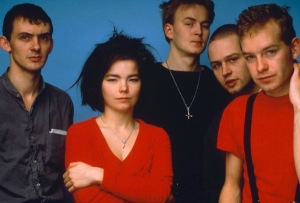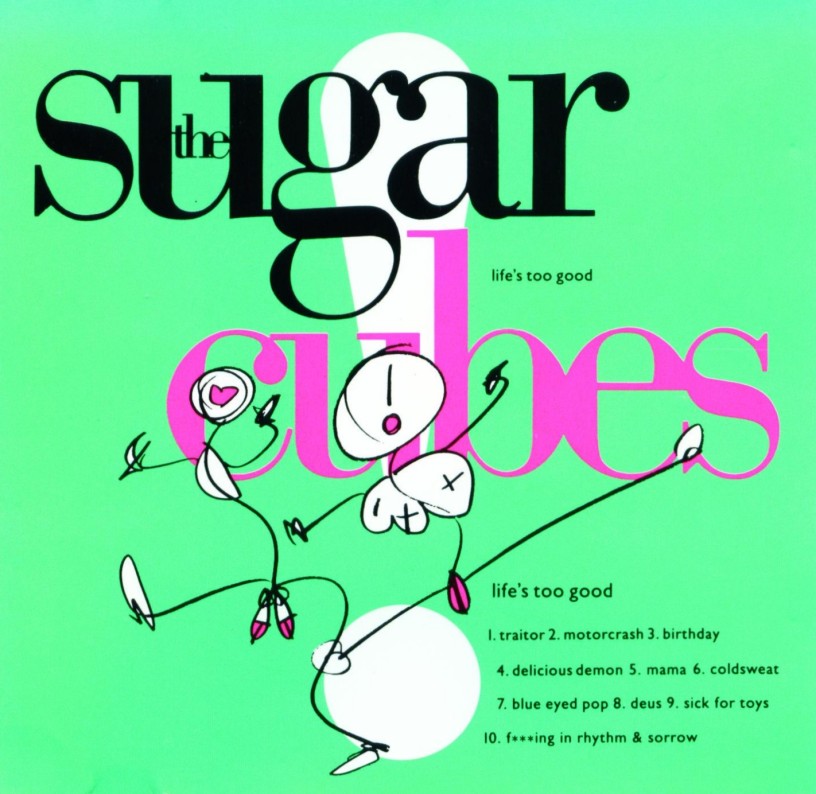Verdict: 8/10
 Contrary to popular belief, the Icelandic solo artist Bjork didn’t just pop into musical relevancy through a cloud of swan feathers; she was recording music as early as 1977, when she released Björk Guðmundsdóttir, an album full of sickeningly cute covers of rock songs. She then found herself in bands that extolled a wide variety of genres, including punk (Spit and Snot, Tappi Tikarrass), jazz fusion (Exodus), and gothic rock (KUKL).
Contrary to popular belief, the Icelandic solo artist Bjork didn’t just pop into musical relevancy through a cloud of swan feathers; she was recording music as early as 1977, when she released Björk Guðmundsdóttir, an album full of sickeningly cute covers of rock songs. She then found herself in bands that extolled a wide variety of genres, including punk (Spit and Snot, Tappi Tikarrass), jazz fusion (Exodus), and gothic rock (KUKL).
When 1986 rolled around, Bjork and her former KUKL band mates formed The Sugarcubes, a melting pot of rock, post-punk, and pop influences. Having an exotically attractive, quirky female singer certainly helped The Sugarcubes get press, but to ignore the contributions of Einar Orn Benidiktsson would be a disservice to the band. Einar and Bjork shared the vocal duties throughout The Sugarcubes’ existence, with Einar contrasting his peculiar deadpan vocal style to his counterpart’s unique soar-and-sunder voice. To put it more simply, they sound like a kookier version of Fred Schneider and Kate Pierson of the B-52’s. This marriage of converse vocals, along with a liberal use of trumpet, flugelhorn, twangy bass, to-the-point percussion, distorted guitars, and New Wave keyboards, gives The Sugarcubes a sound that is familiar yet refreshingly idiosyncratic.
The group’s 1988 debut album, Life’s Too Good, is probably the most consistent in their short discography. It begins in unusual fashion with the track “Traitor,” which starts off with incoherent mumbling with a bit of harmonica playing along, before bursting into a spoken-word session with Einar, who greets us with an admission:
“My punctuality is well known / When the revolution takes place / I’ll be late and I’ll be shot / As a traitor / Oh, sun rises”
Accompanying his ranting is Bjork’s voice – cool and ghostly – amid a pulsing rhythm and flourishes of harmonica. Quite an unusual way to start an album, but it perfectly captures the spirit of The Sugarcubes.
Life’s Too Good does a complete 180 degree turn with “Motorcrash,” a Latin-flavored burst of salsa horns and plucky bass lines. Next is “Birthday,” the single that put the band on the map. Indeed, this song is completely deserving of its success; Bjork takes center stage and masterfully weaves her vocal chords through a forest of thick, rumbling bass and tribal percussion. I’m crazy about her inflections here:
“Thread worms on a string / Keeps spiders in her pocket / Collects fly-wings in a jar / Scrubs horse flies and pinches them on a line”
The next track, “Delicious Demon,” is definitely the strongest example of the B-52’s sound that I mentioned. It’s fun and full of energy (and cowbell), as Bjork wails ecstatically while Einar spits out his best Fred Schneider impression. “Mama” has the ‘Cubes dipping their toes in post-punk waters, as the slow crawl of guitar and bass recalls to mind Public Image Ltd.’s “Poptones.”
At last, we come to “Coldsweat,” my favorite cut off Life’s Too Good. As on “Birthday,” Bjork is front-and-center here, with Einar only providing a small passage. The atmosphere is gloomy and the lyrics are dark, but Bjork shines through the miasma with vocal delivery that sends chills up my spine. She is especially effective with these lyrics:
“I’ll show you with my fingers / Draw with the eye / With your own breath / I’ll tear your lungs”
Musically, “Blue-Eyed Pop” reminds me of Blur in the way the bass groove mingles with the guitars and keyboards. The song’s nothing exceptional, but still fun. “Deus” is The Sugarcubes’ swipe at organized religion, specifically the concept of a god. Herein lies the most bizarre of Einar’s lyrics:
“I once met him / It really surprised me / He put me in a bath tub / Made me squeaky clean / Really clean”
Yes, he’s singing about God giving him a bubble bath. More likely, it’s a mockery of the ideas of sinning and forgiveness, but I think it’s more fun with bubbles, don’t you?
“Sick For Toys” opens with an almost hymn-like effort from Bjork, before launching into a galloping number with a bit of surf-rock. The album closes just as it began – oddly. “Fucking in Rhythm and Sorrow” contains a mixture of tuba and lots of horns, with Bjork stealing a page from Einar’s playbook in her delivery of the lyrics. Other than that, it’s a pretty unremarkable ending.
Thankfully, there are CD versions of Life’s Too Good that contain some fun bonus tracks, which include the hilariously dark “Take Some Petrol, Darling” which has Einar growling like a demon in a kiddie haunted house. Also featured are remixes of “Coldsweat” and “Deus,” the former being inferior and the latter superior to their respective originals. The best of the bonus tracks are “Dragon” and “Cat,” both sung in Icelandic. “Dragon” contains an ultra-heavy bass line that backs Einar rasping in a black metal vocal style. Think a metalized Peter Gunn theme with Enslaved vocalist Grutle Kjellson grunting along, and you’ll have an idea what this puppy sounds like. “Cat” is the counterpart to “Dragon,” possibly an ode to the vagina, which features a chorus that has Bjork repeatedly belting out words like “cat,” “pussy” and what sounds like “fuck.” It’s a real blast, despite the tomfoolery.
Life’s Too Good is too good (I had to say it) to ignore. There are a few fillers on the album, but they certainly aren’t bad songs. There are far, far more bangs than duds here, so reach on back to the 80s and grab a copy; there’s enough flugelhorn to go around.
By: Billy G.
